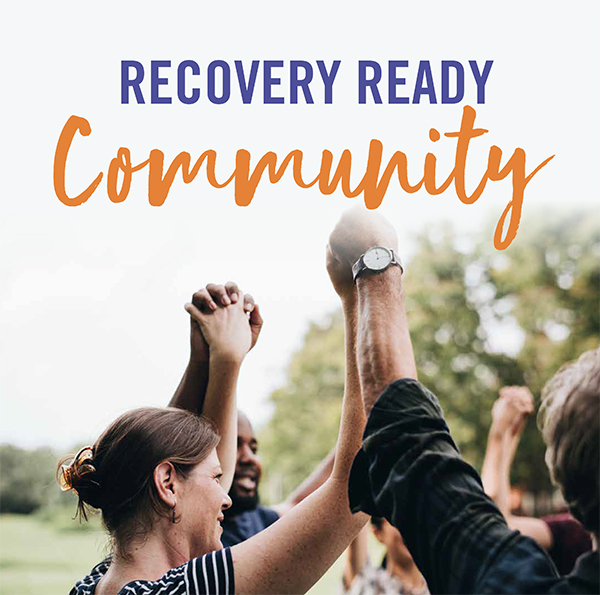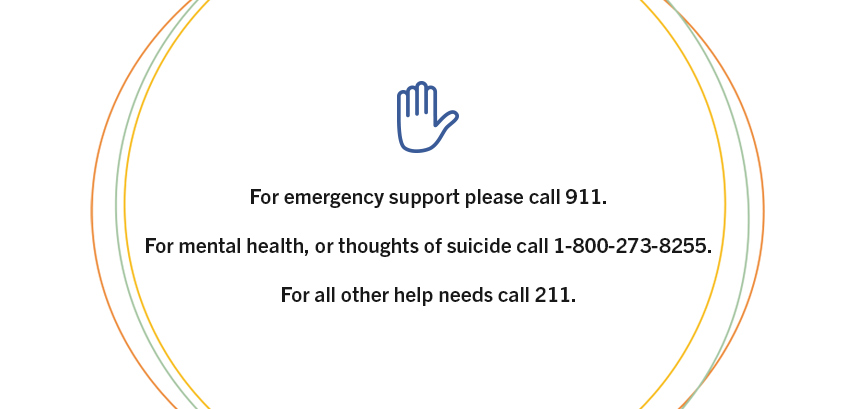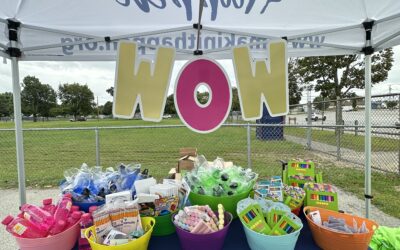Recovery Ready Community
 Our team has identified the development and support of a Ready Communities culture as a critical component of building resiliency. This work is focused on developing a culture of understanding and support for people dealing with mental illness and substance use. Through our recovery ready workplace initiative, employers work to foster a culture that ensures all employees and family members have access to the prevention, intervention, treatment, and recovery programs offered. With community-based harm-reduction services, providers strive to offer services that help save lives and reduce the damage caused by substance use.
Our team has identified the development and support of a Ready Communities culture as a critical component of building resiliency. This work is focused on developing a culture of understanding and support for people dealing with mental illness and substance use. Through our recovery ready workplace initiative, employers work to foster a culture that ensures all employees and family members have access to the prevention, intervention, treatment, and recovery programs offered. With community-based harm-reduction services, providers strive to offer services that help save lives and reduce the damage caused by substance use.
Makin’ It Happen is partnering with organizations in the Greater Manchester region to tackle these issues and improve the lives of individuals and the communities we serve. Read more below!
Recovery Ready Workplaces
While many companies and organizations allow employees to leave work for a physical therapy appointment or to support their spouse by accompanying them to cancer treatments, there is still a stigma for those who need assistance for behavioral health or substance use disorder treatments.
We are working to change this, to ensure equal access to all health-related treatments. Interested in learning how becoming a recovery ready business can lead to a better place to work for all of your employees?
Reach out to Mary Forsythe Taber, community of care manager, at [email protected]., and we will help you with the following:
- Recovery Friendly Workplace Guide and Assessment – The Readiness Guide and Assessment is a great tool to identify how to get started. We will go through a list of questions about your policies. Chances are they are already very supportive of employees in recovery! Do you offer Employee Assistance Programming (EAP), and is it available to all employees regardless of status? Do you have a wellness committee? Do your benefits have the same coverage for physical and mental health? How is your understanding of the Americans with Disabilities Act (ADA) in regards to substance use disorder recovery? We will explore these questions and many more to get your policies and benefits recovery ready!
- Planning for Progress – We will help you develop guidelines for on-boarding new employees and annual refresher trainings around your recovery ready program. In addition, we will update you on emerging trends and threats surrounding wellness in your workforce.
- Recovery Friendly Support for Substance Use Disorder Professionals – People who help people have a unique set of challenges when it comes to wellness. Compassion fatigue, vicarious trauma, and maintaining boundaries can all be difficult. We have special training to raise awareness for your workforce, “Helping Helpers.”
- Ambassadors for Wellness – Makin’ it Happen has a network of business leaders, through the Greater Manchester Chamber’s Leadership Greater Manchester, who are available to discuss the recovery ready process from a peer-to-peer standpoint. They have gone through it, and are happy to share their experience with you!
For more information on the Recovery Friendly Workplace Initiative go to:
https://www.recoveryfriendlyworkplace.com/contact
https://www.facebook.com/RecoveryFriendlyNH/
The following organizations are active participants in the NH Recovery Friendly Workplace initiative within the Greater Manchester Region:
Recovery Friendly Workplace Policy Audit
We will go through a list of questions about your policies. Chances are they are already very supportive of employees in recovery! Do you offer Employee Assistance Programming (EAP), and is it available to all employees regardless of status? Do you have a wellness committee? Do your benefits have the same coverage for physical and mental health? How is your understanding of the Americans with Disabilities Act (ADA) in regards to SUD recovery?
We will explore these questions and many more to get your policies and benefits Recovery Ready!
Planning for Progress
We will help you develop guidelines for on-boarding new employees and annual refresher trainings around your Recovery Ready Program. In addition, we will update you on emerging trends & threats surrounding wellness in your workforce.
Recovery Friendly Support for SUD Professionals
People who help people have a unique set of challenges when it comes to wellness. Compassion fatigue, vicarious trauma and maintaining boundaries can all be difficult. We have special training to raise awareness for your workforce, “Helping Helpers.”
Ambassadors’ for Wellness
Makin’ it Happen has a network of business leaders, through the Manchester Chambers Leadership Greater Manchester, who are available to discuss the Recovery Ready Process from a peer to peer standpoint. They have gone through it, and are happy to share their experience with you!
Recovery Ready Workplaces
While many companies and organizations allow employees to leave work for a physical therapy appointment or to support their spouse by accompanying them to cancer treatments, there is still a stigma for those who need assistance for behavioral health or substance use disorder treatments.
We are working to change this, to ensure equal access to all health-related treatments. Interested in learning how becoming a recovery ready business can lead to a better place to work for all of your employees?
Reach out to Mary Forsythe Taber, community of care manager, at [email protected], and we will help you with the following:
- Recovery Friendly Workplace Guide and Assessment – The Readiness Guide and Assessment is a great tool to identify how to get started. We will go through a list of questions about your policies. Chances are they are already very supportive of employees in recovery! Do you offer Employee Assistance Programming (EAP), and is it available to all employees regardless of status? Do you have a wellness committee? Do your benefits have the same coverage for physical and mental health? How is your understanding of the Americans with Disabilities Act (ADA) in regards to substance use disorder recovery? We will explore these questions and many more to get your policies and benefits recovery ready!
- Planning for Progress – We will help you develop guidelines for on-boarding new employees and annual refresher trainings around your recovery ready program. In addition, we will update you on emerging trends and threats surrounding wellness in your workforce.
- Recovery Friendly Support for Substance Use Disorder Professionals – People who help people have a unique set of challenges when it comes to wellness. Compassion fatigue, vicarious trauma, and maintaining boundaries can all be difficult. We have special training to raise awareness for your workforce, “Helping Helpers.”
- Ambassadors for Wellness – Makin’ it Happen has a network of business leaders, through the Greater Manchester Chamber’s Leadership Greater Manchester, who are available to discuss the recovery ready process from a peer-to-peer standpoint. They have gone through it, and are happy to share their experience with you!
For more information on the Recovery Friendly Workplace Initiative go to:
https://www.recoveryfriendlyworkplace.com/contact
https://www.facebook.com/RecoveryFriendlyNH/
The following organizations are active participants in the NH Recovery Friendly Workplace initiative within the Greater Manchester Region:
Recovery Friendly Workplace Policy Audit
We will go through a list of questions about your policies. Chances are they are already very supportive of employees in recovery! Do you offer Employee Assistance Programming (EAP), and is it available to all employees regardless of status? Do you have a wellness committee? Do your benefits have the same coverage for physical and mental health? How is your understanding of the Americans with Disabilities Act (ADA) in regards to SUD recovery?
We will explore these questions and many more to get your policies and benefits Recovery Ready!
Planning for Progress
We will help you develop guidelines for on-boarding new employees and annual refresher trainings around your Recovery Ready Program. In addition, we will update you on emerging trends & threats surrounding wellness in your workforce.
Recovery Friendly Support for SUD Professionals
People who help people have a unique set of challenges when it comes to wellness. Compassion fatigue, vicarious trauma and maintaining boundaries can all be difficult. We have special training to raise awareness for your workforce, “Helping Helpers.”
Ambassadors’ for Wellness
Makin’ it Happen has a network of business leaders, through the Manchester Chambers Leadership Greater Manchester, who are available to discuss the Recovery Ready Process from a peer to peer standpoint. They have gone through it, and are happy to share their experience with you!
Harm Reduction
 Harm reduction (HR) is programs, policies, and practices that aim to minimize negative health impacts. They include things like using a seatbelt, wearing a motorcycle helmet, or applying sunscreen. Currently, common harm reduction practices include wearing a face covering, social distancing, and hand washing to reduce the risks of contracting – and being harmed by – COVID-19.
Harm reduction (HR) is programs, policies, and practices that aim to minimize negative health impacts. They include things like using a seatbelt, wearing a motorcycle helmet, or applying sunscreen. Currently, common harm reduction practices include wearing a face covering, social distancing, and hand washing to reduce the risks of contracting – and being harmed by – COVID-19.
For those with Substance Use Disorder, harm reduction services save lives. When using clean needles, people avoid spreading infectious diseases, such as HIV and Hepatitis. In addition, the following are also important elements of a strong HR model.
Other harm reduction services include:
- connecting people to primary care and mental health services

- Giving them access to Naloxone (Narcan)
- providing treatment instead of incarceration
- offering screening and vaccinations for treatment for sexually transmitted diseases
- helping people enroll in health insurance
According to the CDC, over the past 30 years, harm reduction programs have had the following benefits:
- Harm reduction services save lives by lowering the likelihood of deaths from overdoses.
- Providing testing, counseling, and sterile injection supplies helps prevent outbreaks of other diseases. For example, Harm reduction services are associated with a 50% decline in the risk of HIV transmission.
- Users of harm reduction services were three times more likely to stop injecting drugs.
- Law enforcement benefits from reduced risk of needlesticks, no increase in crime, and the ability to save lives by preventing overdoses.
- When two similar cities were compared, the one with harm reduction services had 86% fewer syringes in places like parks and sidewalks.
In early 2021, the Greater Manchester Region rolled out a Harm Reduction Strategy document. Click here to view it.
Substance Use Disorder – Greater Manchester Substance Use Disorder (SUD) Collaborative (19+ Continuum of Care Collaborative)
The Greater Manchester SUD Collaborative gathers agencies, organizations, and providers from across the SUD continuum of care which includes prevention, intervention, treatment, and recovery. This collaborative meets monthly to community problem solve, evaluate the continuum’s assets and gaps, communicate about their programs and services, and hear about the latest industry trends and emerging issues.
For more information, please reach out to Mary Forsythe Taber, executive director, at [email protected].
RECOVERY READY COMMUNITY
Hillsborough-North SIM Workshop Provides A Roadmap For The Future!
Due to the success of Hillsborough County-Northern Judicial District Sequential Intercept Model Mapping Workshop...
Let’s Help Make it Happen! Manchester Takes a Stand Against Addiction and the Homelessness Crisis.
The City of Manchester has been selected as one of one hundred cities nationwide for the Anti-Stigma Initiative led by the Addiction Policy Forum.
Wellness on Wheel’s 2023 (WOW’23)
And just like that! The WOW’23 summer series is complete! Our journey through the Wellness on Wheels summer series in...
Contact Us
Fill out the form with your questions or comments, and we’ll get back to you!























